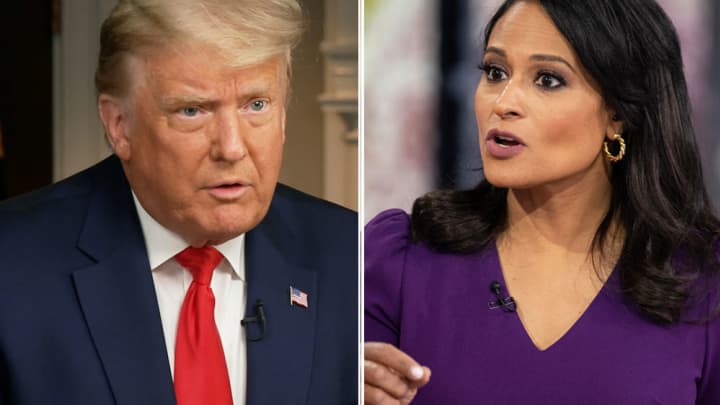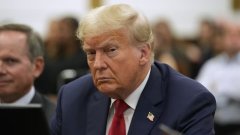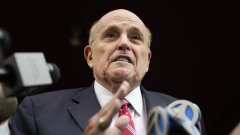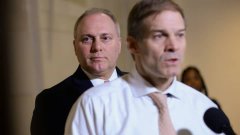
Former President isn't losing sleep over the prospect that he could end up behind bars, he said in an exclusive interview with NBC's "Meet the Press" moderator Kristen Welker.
"I don't even think about it," Trump, who has been indicted four times this year, said when asked if he worries about prison at night. "I'm built a little differently I guess, because I have had people come up to me and say, 'How do you do it, sir? How do you do it?' I don't even think about it."
Read more from NBC News:
Later in the interview, which was recorded Thursday at Trump's Bedminster golf club and which airs Sunday on NBC affiliates, the former president returned to the question.
"When you say, do I lose sleep? I sleep," he said. "I sleep. Because I truly feel that, in the end, we're going to win."
NBC News has also extended an invitation to President Joe Biden to sit down with Welker for an interview.
Trump, who is running far ahead of his competitors for the 2024 Republican presidential nomination, offered his most extensive remarks on Jan. 6 and the peril he faces from charges that his retention of classified documents and failed attempts to overturn the 2020 election were illegal.
He took responsibility for the decision to try to reverse his loss.
"We have many people, and it's my choice," he said at one point, later adding, "It was my decision. But I listened to some people."
He said he did not heed advice from top administration and campaign lawyers who told him he had lost the election "because I didn't respect them as lawyers."
When Welker noted that he had hired them, Trump portrayed them as turncoats — Republicans in name only.
"They turn out to be RINOs, or they turn out to be not so good, in many cases, I didn't respect them," he said. "But I did respect others. I respected many others that said the election was rigged."
Trump further said that he needed only about 22,000 votes spread across key battleground states to have been declared the winner — a figure that would be on target if votes had been cast for him rather than Biden.
"Are you acknowledging you didn't win?" Welker asked.
"I'm not acknowledging," he said. "No. I say I won the election."
Trump faces trial in federal court in Washington, D.C., on charges of conspiracy to defraud the United States; conspiracy to obstruct an official proceeding — the certification of electoral votes; obstruction; and conspiracy to deny the right to vote. Those charges stem from a nearly two-month campaign to stop Biden's election from being cemented, an effort that culminated in his supporters storming the Capitol on Jan. 6, 2021, to stop electoral votes from being counted.
He has also been charged in Georgia in connection with his push to overturn that state's result.
He said he has "no" regrets — "none whatsoever" — about a Jan. 2, 2021, phone call in which he asked Georgia Secretary of State Brad Raffensberger to come up with more votes to upend his defeat in the state.
"I just want to find 11,780 votes, which is one more than we have because we won the state," Trump said on the call, which he claims was illegally recorded because he didn't give his consent to be taped.
Trump also accused President Joe Biden, who has studiously avoided weighing in on the charges, of propagating "Biden indictments" — despite Attorney General Merrick Garland's appointment of special counsels to investigate separate allegations against Trump, Biden and Biden's son, Hunter Biden, who was indicted on gun-related charges Thursday.
In a separate federal trial, Trump has been charged with keeping and hiding classified documents from the federal government.
He said that he never ordered anyone to delete security footage from his Mar-a-Lago resort — and said he would testify to that in court.
Calling the allegation "false," he said, "I'll testify. ... So it's a fake charge. But more importantly, the tapes weren't deleted. In other words, there was nothing done to them. And they were my tapes."
But Trump's most immediate legal jeopardy may come from his actions on Jan. 6. In the interview, he disputed the testimony of Cassidy Hutchinson, a White House aide, who told the House Jan. 6 committee that he had been so determined to go to the Capitol following a speech near the White House that day that he lunged at, and tried to choke, a Secret Service officer to change the direction of his limousine. He also played down his role in the riot that ensued after he told his supporters to march to the Capitol.
"First of all, I had very little to do with Jan. 6," Trump said. "I was asked to speak. And I was the president of the United States. I'm allowed to do that. But I was asked to speak."
Welker pressed him on his version of events.
"So I spoke. And then I went back," Trump said, referring to his return to the White House. "I wanted to go down peacefully and patriotically to the Capitol. Secret Service, who I have great respect for, said, 'Sir, it's better if you don't do that. It could be unsafe.'"
The officer didn't say that "because of riots," Trump said, alluding to the threat to a president. "You know, it takes one guy with bad intentions. Okay, so I didn't have a dispute with them."
Then, he took issue with Hutchinson's testimony.
"You know you had one person said I grabbed the man around the neck," he said. "Actually, I wish I was so strong to be able to do that. These are all tough guys, smart guys."
Welker asked Trump to confirm he was disputing Hutchinson's account.
"Dispute it? Who wouldn't dispute it? She's — the craziest account I've ever heard. You mean that I was in 'The Beast,'" he said, referring to the nickname of the presidential limousine, "and she said I was in 'The Beast,' and the Secret Service didn't want — so I took a guy who was like a black belt in karate and grabbed his neck and tried to choke him...How ridiculous."




